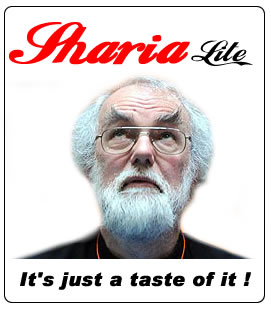The Archbishop of Canterbury has condemned evangelist “bullies” who attempt to convert people of other faiths to Christianity.
Dr Rowan Williams said it was right to be suspicious of proselytism that involves “bullying, insensitive approaches” to other faiths.
In a speech at Guildford cathedral, Dr Williams criticised those who believed they had all the answers and treated non-Christians as if their traditions of reflection and imagination were of no interest to anyone. “God save us form that kind of approach,” he said.
But he added: “God save us also from the nervousness about our own conviction that doesn’t allow us to say we speak about Jesus because we believe he matters, we believe he matters, because we believe that in him human beings find their peace, their destinies converge, and their dignities are fully honoured.”
In his address, titled “The Finality of Christ in a Pluralist World”, Dr Williams addressed difficulties modern Christians have with Biblical texts which suggest that Christianity is the only path to salvation.
Dr Williams admitted that in the past four decades, the problems around the classical interpretation of these texts had become more prominent.
He asked: “What about all those people who never had a chance of hearing about Jesus?”
He also asked about the generations before Jesus and the many cultures untouched by Christianity.
“Can we believe in a just God, who in effect punishes people, for not being in the right place at the right time?”
He raised a political objection to the claim that Christ is the final truth about God and the Universe, suggesting it had helped justify “wicked” things such as crusading and colonialism.
“What could we possibly mean by saying that a truth expressed in the Middle East 2,000 years ago was truth applicable to everybody, everywhere?” he asked.
Belief in the uniqueness or finality of Christ, in the way it has usually been understood, is something that “sits very badly indeed, not just with a plural society – whatever that means – but with a society that regards itself as liberal or democratic”.
In the Gospels, Jesus said: “No one comes to the father, except through me.”
Dr Williams said that in this context: “The father cannot be shown as an object in the sky, something abstract, something you can point to.” Instead, God should be understood in the first or second person, walking with Jesus towards the cross and resurrection.”
The Archbishop’s speech was an attempt to reconcile the claims of the Bible about Jesus and Christianity with the multi-faith societies in which Christians around the world must live.
The Gospels and the rest of the New Testament urge believers to spread the “good news” or evangelise, but the need for good relations with other faiths in the secular world militates against proselytism.
Dr Williams said: “When we sit along side the Jew, the Buddhist, the Muslim, Hindu, when we sit alongside them, we expect to see in their humanity something that challenges and enlarges us.”
The Archbishop quoted the Koran: “And God did not elect to make everybody the same. God has made us to learn in dialogue.”
On the question of whether Christians could legitimately believe that people of other faiths could be saved, Dr Williams said believers were too reluctant to leave this to God to sort out.
“We have often a vague feeling that God hasn’t read the proper books,” he said. “I’m very content to let God be the judge of how far anyone outside the visible family of faith is related to Jesus or has turned towards the father.”
To paraphrase C. S. Lewis, if Jesus is who he claims to be, he is of ultimate importance; if he isn’t, he is of no importance at all. The one thing he cannot be is what Rowan is determined to make him: moderately important.
Next month, Rowan will give a lecture on why the Western Anglican Church is disappearing.




